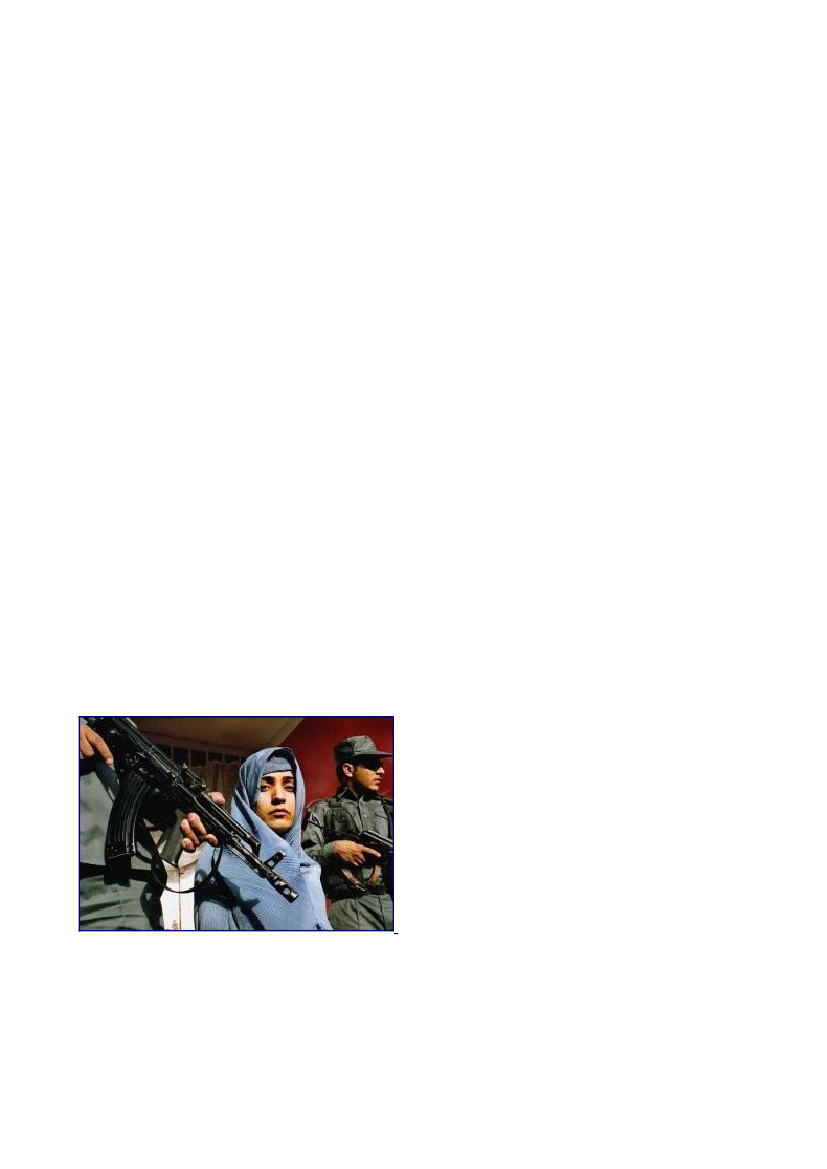Udenrigsudvalget 2008-09
URU Alm.del Bilag 255
Offentligt
Til Udenrigsministeren og Udenrigsudvalget.I det jeg fremsender en afskrift af artikel fra The Independent, tirsdag den 28. juli 2009, vil jeggerne spørge ministeren og udvalget, om I mener, at Afghanistan i dag er et demokrati? Da jeg gårud fra, at Danmark, som medlem af den internationale koalition, har et medansvar for opbygningenaf statslige institutioner i Afghanistan (herunder et retsvæsen), ser jeg frem til at høre jeres meningom, hvornår I forventer, at de mange krigsforbrydere som sidder i Afghanistans parlament, kanventes retsforfulgt, enten i Afghanistan eller ved en international domstol?Til Venstres medlemmer af udvalget: Hvis I mangler kandidater til jeres partis frihedspris, så synesjeg i skulle indstille Malalai Joya.Mvh.Mads Mikkel Tørsleff, Århus.
The Independent, Tirsdag 28. juli 2009.
Malalai Joya: The woman who will not besilencedEnraged by Taliban oppression Malalai Joya became a women’s rights activist, and after the US-ledinvasion, took on the new regime as an MP. But speaking out has come at a cost. She tells JohannHari why death threats won’t stop her exposing ugly truths about Afghanistan.Tuesday, 28 July 2009
Getty
The story of Joya is the story of another Afghanistan - the one behind the burka, and behind thepropaganda
Iam not sure how many more days I will be alive," Malalai Joya says quietly.
The warlords who make up the new "democratic" government in Afghanistan have been sendingbullets and bombs to kill this tiny 30-year-old from the refugee camps for years – and they seem tobe getting closer with every attempt. Her enemies call her a "dead woman walking". "But I don'tfear death, I fear remaining silent in the face of injustice," she says plainly. "I am young and I wantto live. But I say to those who would eliminate my voice: 'I am ready, wherever and whenever youmight strike. You can cut down the flower, but nothing can stop the coming of the spring.'"The story of Malalai Joya turns everything we have been told about Afghanistan inside out. In theofficial rhetoric, she is what we have been fighting for. Here is a young Afghan woman who set up asecret underground school for girls under the Taliban and – when they were toppled – cast off theburka, ran for parliament, and took on the religious fundamentalists.But she says: "Dust has been thrown into the eyes of the world by your governments. You have notbeen told the truth. The situation now is as catastrophic as it was under the Taliban for women. Yourgovernments have replaced the fundamentalist rule of the Taliban with another fundamentalistregime of warlords. [That is] what your soldiers are dying for." Instead of being liberated, she is onthe brink of being killed.The story of Joya is the story of another Afghanistan – the one behind the burka, and behind thepropaganda.I. "We are our sisters' keepers"I meet Joya in a London apartment where she is staying with a supporter for a week, to talk abouther memoir – but even here, her movements have to be kept secret, as she flits from one safe houseto another. I am told not to mention her location to anyone. She is standing in the corridor, smalland slim, with her hair flowing freely, and she greets me with a solid handshake. But, when ourphotographer snaps her, she begins to giggle girlishly: the grief etched on to her sallow face meltsaway, and she laughs in joyous little squeaks. "I can never get used to this!" she says.Then, as I sit her down to talk through her life-story, the pain soaks into her face once more. Herbody tightens into a tense coil, and her fists close.Joya was four days old when the Soviet Union invaded Afghanistan. On that day, her father droppedout of his studies to fight the invading Communist army, and vanished into the mountains. She says:"Since then, all we have known is war."Her earliest memory is of clinging to her mother's legs while policemen ransacked their houselooking for evidence of where her father was hiding. Her illiterate mother tried to keep her family of10 children alive as best she could. When the police became too aggressive, she took her kids torefugee camps across the border in Iran. In these filthy tent-cities lying on the old Silk Road,Afghans huddled together and were treated as second-class citizens by the Iranian regime. At night,wild animals could wander into the tents and attack children. There, word reached the family thatJoya's father had been blown up by a landmine – but he was alive, after losing a leg.There were no schools in the Iranian camps, and Joya's mother was determined her daughters wouldreceive the education she never had. So they fled again, to camps in western Pakistan. There, Joyabegan to read – and was transformed. "Tell me what you read and I shall tell you what you are," shesays. Starting in her early teens, she inhaled all the literature she could – from Persian poetry to theplays of Bertolt Brecht to the speeches of Martin Luther King. She began to teach her new-foundliteracy to the older women in the camps, including her own mother.She soon discovered that she loved to teach – and, when she turned 16, a charity called theOrganisation for Promoting Afghan Women's Capabilities (OPAWC) made a bold suggestion: go toAfghanistan, and set up a secret school for girls, under the noses of the Taliban tyranny.So she gathered her few clothes and books and was smuggled across the border – and "the best days
of my life" began. She loathed being forced to wear a burka, being harassed on the streets by theomnipresent "vice and virtue" police, and being under constant threat of being discovered andexecuted. But she says it was worth it for the little girls. "Every time a new girl joined the class, itwas a triumph," she says, beaming. "There is no better feeling."She only just avoided being caught, again and again. One time she was teaching a class of girls in afamily's basement when the mother of the house yelled down suddenly: "Taliban! Taliban!" Joyasays: "I told my students to lie down on the floor and stay totally silent. We heard footsteps aboveus and waited a long time." On many occasions, ordinary men and women – anonymous strangers –helped her out by sending the police charging off in the wrong direction. She adds: "Every day inAfghanistan, even now, hundreds if not thousands of ordinary women act out these small gesturesof solidarity with each other. We are our sisters' keepers."The charity was so impressed with her they appointed her their director. Joya decided to set up aclinic for poor women just before the 9/11 attacks. When the American invasion began, the Talibanfled her province, but the bombs kept falling. "Many lives were needlessly lost, just like during theSeptember 11 tragedy," she says. "The noise was terrifying, and children covered their ears andscreamed and cried. Smoke and dust rose and lingered in the air with every bomb dropped."As soon as the Taliban retreated, they were replaced – by the warlords who had ruled Afghanistanimmediately before. Joya says that, at this point, "I realised women's rights had been sold outcompletely... Most people in the West have been led to believe that the intolerance and brutalitytowards women in Afghanistan began with the Taliban regime. But this is a lie. Many of the worstatrocities were committed by the fundamentalist mujahedin during the civil war between 1992 and1996. They introduced the laws oppressing women followed by the Taliban – and now they weremarching back to power, backed by the United States. They immediately went back to their oldhabit of using rape to punish their enemies and reward their fighters."The warlords "have ruled Afghanistan ever since," she adds. While a "showcase parliament hasbeen created for the benefit of the US in Kabul", the real power "is with these fundamentalists whorule everywhere outside Kabul". As an example, she names the former governor of Herat, IsmailKhan. He set up his own "vice and virtue" squads which terrorised women and smashed up videoand music cassettes. He had his own "private militias, private jails". The constitution of Afghanistanis irrelevant in these private fiefdoms.Joya discovered just what this meant when she started to set up the clinic – and a local warlordannounced that it would not be allowed, since she was a woman, and a critic of fundamentalism.She did it anyway, and decided to fight this fundamentalist by running in the election for the Loyajirga ("meeting of the elders") to draw up the new Afghan constitution. There was a great swellingof support for this girl who wanted to build a clinic – and she was elected. "It turned out mymission," she says, "would be to expose the true nature of the jirga from within."II. "I would never again be safe"As she stepped past the world's television cameras into the Loya jirga, the first thing Joya saw was"a long row with some of the worst abusers of human rights that our country had ever known –warlords and war criminals and fascists".She could see the men who invited Osama bin Laden into the country, the men who introduced themisogynist laws later followed by the Taliban, the men who had massacred Afghan civilians. Somehad got there by intimidating the electorate, others by vote-rigging, and yet more were simplyappointed by Hamid Karzai, the former oilman installed by the US army to run the country. Shethought of an old Afghan saying: "It's the same donkey, with a new saddle."For a moment, as these old killers started to give long speeches congratulating themselves on thetransition to democracy, Joya felt nervous. But then, she says, "I remembered the oppression we
face as women in my country, and my nervousness evaporated, replaced by anger."When her turn came, she stood, looked around at the blood-soaked warlords on every side, andbegan to speak. "Why are we allowing criminals to be present here? They are responsible for oursituation now... It is they who turned our country into the centre of national and international wars.They are the most anti-women elements in our society who have brought our country to this stateand they intend to do the same again... They should instead be prosecuted in the national andinternational courts."These warlords – who brag about being hard men – could not cope with a slender young womanspeaking the truth. They began to shriek and howl, calling her a "prostitute" and "infidel", andthrowing bottles at her. One man tried to punch her in the face. Her microphone was cut off and thejirga descended into a riot."From that moment on," Joya says, "I would never again be safe... For fundamentalists, a women ishalf a human, meant only to fulfil a man's every wish and lust, and to produce children and toil inthe home. They could not believe that a young woman was tearing off their masks in front of theeyes of the Afghan people."A fundamentalist mob turned up a few hours later at her accommodation, announcing they hadcome to rape and lynch her. She had to be placed under immediate armed guard – but she refused tobe protected by American troops, insisting on Afghan officers.Her speech was broadcast all over the world – and cheered in Afghanistan. She was flooded withsupport from the people of her country, delighted that somebody had finally spoken out. One dirt-poor village pooled its cash to send a delegate hundreds of miles across the country to explain howpleased they were.An extremely old woman was brought to her in a rickety wheelbarrow, and she explained she hadlost two sons – one to the Soviets, one to the fundamentalists. She told Joya: "I am almost 100 yearsold, and I am dying. When I heard about you and what you said, I knew that I had to meet you. Godmust protect you, my dear."She handed over her gold ring, her only valuable possession, and said: "You must take it! I havesuffered so much in my life, and my last wish is that you accept this gift from me."But the US and Nato occupiers instructed Joya that she must show "politeness and respect" for theother delegates. When Zalmay Khalilzad, the US Ambassador, said this, she replied: "If thesecriminals raped your mother or your daughter or your grandmother, or killed seven of your sons, letalone destroyed all the moral and material treasure of your country, what words would you useagainst such criminals that will be inside the framework of politeness and respect?"She leans forward and quotes Brecht: "He says, 'He who does not know the truth is only a fool. Hewho knows the truth and calls it a lie is a criminal.'"The attempts to murder her began then with a sniper – and have not stopped since. But she saysplainly, with her fist clenched: "I wanted the warlords to know I was not afraid of them."So she ran for parliament – and won in a landslide. "I would return again to face those who hadruined my country," she explains, "and I was determined that I would stand straight and never bowagain to their threats."III. "In every corner is a killer"Joya looked out across the new Afghan parliament on her first day and thought: "In every corner isa killer, a puppet, a criminal, a drug lord, a fascist. This is not democracy. I am one of the very fewpeople here who has been genuinely elected." She started her maiden speech by saying: "Mycondolences to the people of Afghanistan..."
Before she could continue, the warlords began to shout that they would rape and kill her. Onewarlord, Abdul Sayyaf, yelled a threat at her. Joya looked him straight in the eye and said: "We arenot in [the area he rules by force] here, so control yourself."I ask if she was frightened, and she shakes her head. "I am never frightened when I tell the truth."She is speaking fast now: "I am truly honoured to have been vilified and threatened by the savagemen who condemned our country to such misery. I feel proud that even though I have no privatearmy, no money, and no world powers behind me, these brutal despots are afraid of me and schemeto eliminate me."She says there is no difference for ordinary Afghans between the Taliban and the equallyfundamentalist warlords. "Which groups are labelled 'terrorist' or 'fundamentalist' depends on howuseful they are to the goals of the US," she says. "You have two sides who terrorise women, but theanti-American side are 'terrorists' and the pro-American side are 'heroes'."Karzai rules only with the permission of the warlords. He is "a shameless puppet" who will winnext month's presidential elections because "he hasn't yet stopped working for his masters, the USand the warlords... At this point in our history, the only people who get to serve as president arethose selected by the US government and the mafia that holds power in our country."Whenever she would despair in parliament, she would meet yet more ordinary Afghan women –and get back in the fight. She tells me about a 16-year-old constituent of hers, Rahella, who ranaway to an orphanage Joya had helped to set up in her constituency. "Her uncle had decided tomarry her off to his son, who was a drug addict. She was terrified. So of course we took her in,educated her, helped her." One day, her uncle turned up and apologised, saying he had learnt theerror of his ways. He asked if she could come home for a weekend to visit her family. Joya agreed –and when she got back to her village, Rahella was forced into marriage and spirited away to anotherpart of Afghanistan. They heard six months later that she had doused herself in petrol and burnedherself alive.There has been an epidemic of self-immolation by women across the "new" Afghanistan in the pastfive years. "The hundreds of Afghan women who set themselves ablaze are not only committingsuicide to escape their misery," she says, "they are crying out for justice."But she was not allowed to raise these issues in the supposedly democratic parliament. Thefundamentalist warlords who couldn't beat Joya at the ballot box or kill her chanced upon a newway to silence her. The more she spoke, the angrier they got. She called for secularism inAfghanistan, saying: "Religion is a private issue, unrelated to political issues and the government...Real Muslims do not require political leaders to guide them to Islam." She condemned the new lawthat declared an amnesty for all war crimes committed in Afghanistan over the past 30 years, saying"You criminals are simply giving yourselves a get-out-of-jail free card." So the MPs simply voted tokick her out of parliament.It was illegal and undemocratic – but the President, Hamid Karzai, supported the ban. "Now thewarlord criminals are unchallenged in parliament," she says. "Is that democracy?"We in the West have been fed "a pack of lies" about what Afghanistan looks like today. "The mediaare 'free' only if they do not try to criticise warlords and officials," she says in her book, Raising MyVoice. As an example, she names a specific warlord: "If you write anything about him, the next dayyou will be tortured or killed by the Northern Alliance warlords." It is "a myth" to say girls can nowgo to school outside Kabul. "Only five per cent of girls, according to the UN, can follow theireducation to the 12th grade."And it is "false" to say Afghan culture is inherently misogynistic. "By the 1950s, there was agrowing women's movement in Afghanistan, demonstrating and fighting for their rights," she says."I have a story here" – she rifles through her notes – "from The New York Times in 1959. Here! Theheadline is 'Afghanistan's women lift the veil'. We were developing an open culture for women –
and then the foreign wars and invasions crushed it all. If we can regain our independence, we canstart this struggle again."Many of her friends urge her to leave the country, before one of her wannabe-assassins gets lucky.But, she says, "I can never leave when all the poor people that I love are living in danger andpoverty. I am not going to search for a better and safer place, and leave them in a burning hell."Apologising for her English – which is, in fact, excellent – she quotes Brecht again: "Those who dostruggle often fail, but those who do not struggle have already failed."Today, she fights for democracy outside parliament. But, she says, any Afghan democrat today is"trapped between two enemies. There are the occupation forces from the sky, dropping clusterbombs and depleted uranium, and on the ground there are the fundamentalist warlords and theTaliban, with their own guns." She wants to help the swelling movement of ordinary Afghans inbetween, who are opposed to both. "With the withdrawal of one enemy, the occupation forces, it[will be] easier to fight against these internal fundamentalist enemies."If she were president of Afghanistan, she would begin by referring all the country's war criminals tothe International Court of Justice at the Hague. "Anybody who has murdered my sisters andbrothers should be punished," she says, "from the Taliban, to the warlords, to George W Bush."Then she would ask all foreign troops to leave immediately. She says that it is wrong to sayAfghanistan will simply collapse into civil war if that happens. "What about the civil war now?Today, people are being killed – many, many war crimes. The longer the foreign troops stay inAfghanistan doing what they are doing, the worse the eventual civil war will be for the Afghanpeople."The Afghan public, she adds, are on her side, pointing to a recent opinion poll showing 60 per centof Afghans want an immediate Nato withdrawal. Many people in Afghanistan were hopeful, shesays, about Barack Obama – "but he is actually intensifying the policy of George Bush... I know hiselection has great symbolic value in terms of the struggle of African-Americans for equal rights, andthis struggle is one I admire and respect. But what is important for the world is not whether thePresident is black or white, but his actions. You can't eat symbolism."US policy is driven by geopolitics, she says, not personalities. "Afghanistan is in the heart of Asia,so it's a very important place to have military bases – so they can control trade very easily withother Asian powers such as China, Russia, Iran and so on."But it can be changed by Americans," she adds. She is passionate now, her voice rising. "I say toObama – in my area, 150 people were blown up by US troops in one incident this year. If yourfamily had been there, would you send even more troops and even more bombs? Your governmentis spending $18m (£11m) to make another Guantanamo jail in Bagram. If your daughter might bedetained there, would you be building it? I say to Obama – change course, or otherwise tomorrowpeople will call you another Bush."IV. "It's hard to be strong all the time""It's not good to show my enemies any weakness, [but] it's hard to be strong all the time," Joya sayswith a sigh, as she runs her hands through her hair. She has been speaking so insistently – with suchpreternatural courage– that it's easy to forget she was just a girl when she was thrust into fightingfundamentalism. She was never allowed an adolescence. The fierce concentration on her face meltsaway, and she looks a little lost. "Yes, my mother is proud of me," she says, "but you know howmothers are – they worry. Whenever I speak to her on the phone, the first sentence and the lastsentence are always 'Take care'."Two years ago, she got married in secret. She can't name her husband publicly, because he would bekilled. Her wedding flowers had to be checked for bombs. She will only say that they met at a pressconference, "and he supports everything I do". She has not seen him "for two months", she says.
"We meet in the safe houses of supporters. I cannot sleep in the same house two nights running. It isa different home every evening."Where does this courage come from? She acts as if the answer is obvious – anyone would do it, sheclaims. But they don't. Perhaps it comes from her belief that the struggle is long and our individuallives are short, so we can only advance our chosen cause by inches, knowing others will pick up ourbaton. "When I die, others will come. I am sure of that," she says.She certainly has a strong sense of belonging to a long history of Afghans who fought for freedom."My parents chose my first name after Malalai of Maiwand. She was a young woman who, in 1880,went to the front line of the second Anglo-Afghan war to tend the wounded. When the fighters wereclose to collapse, she picked up the Afghan flag and led the men into battle herself. She was struckdown – but the British suffered a landmark defeat, and, in the end, they were driven out."When she ran for office, she had to choose a surname for herself, to protect her family's identity. "Inamed myself after Sarwar Joya, the Afghan poet and constitutionalist. He spent 24 years in jails,and was finally killed because he wouldn't compromise his democratic principles... In Afghanistanwe have a saying: the truth is like the sun. When it comes up, nobody can block it out or hide it."Malalai Joya knows she could be killed any day now, in our newly liberated Warlord-istan. Shehugs me goodbye and says, "We must keep in touch." But I find myself bleakly wondering if wewill ever meet again. Perhaps she senses this, because she suddenly urges me to look again at thelast paragraph of her memoir, Raising My Voice. "It really is how I feel," she says. It reads: "If Ishould die, and you should choose to carry on my work, you are welcome to visit my grave. Poursome water on it and shout three times. I want to hear your voice." I look up into her face, and she isgiving me the bravest smile I have ever seen.'Raising My Voice' by Malalai Joya is published by Rider at £11.99. All profits will go to supportingthe cause of women's rights in Afghanistan. You can donate to her campaigns atmalalaijoya.com/index1024.htm







